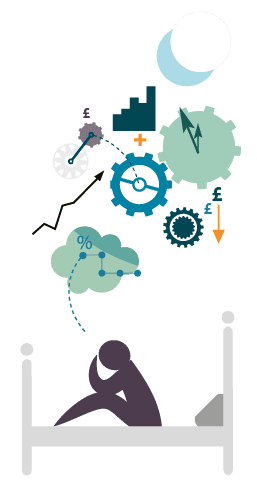Patient with a sleep problem?
Insomnia is a growing problem for medical professionals and unfortunately there is a lack of understanding of how to treat it. A recent study has shown that GPs feel a pressure to prescribe pills and, in an attempt to avoid the hypnotics that have such significant side effects, are moving to non-licensed medication which has little or no effect on the condition.
Read about that paper here.
The problem is insomnia is not just a physical ailment to be rectified; it is a complicated psychophysiological process and although some drugs can initiate sleep, they can only act as a control method and will never treat the insomnia long term. More worryingly, these drugs can alter sleep architecture and remove stages of sleep that are so important for cell restoration, recuperation and memory consolidation.
I began the CBTi programme feeling a bit reluctant and sceptical. Like lots of insomniacs, I felt I’d tried everything – and feared this would be yet another failed attempt. It was a delight to discover that Steph’s methods actually work – and are all backed up by rigorous scientific research. After 20 years of surviving on a just a couple of hours, I’m now getting a full night’s sleep. And, for a chronic insomniac, that’s truly transformative! Steph’s experience and enthusiasm, coupled with her effective methods, make for a powerful, drug-free solution to insomnia.
RP, London
Sleepyhead Clinic in Exeter, Devon offers patients scientifically proven techniques based on Cognitive Behavioural Therapy for insomnia (CBTI) provided by a sleep expert. This is not standard CBT that is commonly used to treat other mental health problems. It is a behavioural sleep medicine approach that can be used to treat insomnia and other sleep related issues.
Read about the efficacy and science behind CBTI here.
Our approach will help you to reduce costs and offer improved care for people with insomnia, by reducing:
- Inappropriate referring
- Repeat consultations
- Prescriptions and repeat prescriptions
The diagnostic criteria for insomnia:
The predominant complaint is general sleep dissatisfaction with one or more of the following symptoms:
- Difficulty initiating asleep
- Difficulty maintaining sleep (i.e., frequent or prolonged awakenings with difficulty returning to sleep)
- Early morning awakening (i.e., premature awakening with inability to return to sleep)
- Non-restorative sleep
The sleep complaint is accompanied by significant distress or impairment in social, occupational, or other important areas of functioning as indicated by the presence of at least one of the following:
- Fatigue or low energy
- Daytime sleepiness
- Cognitive impairments (e.g., attention, concentration, memory)
- Mood disturbance (e.g., irritability, dysphoria)
- Impaired occupational function
- Impaired interpersonal/social function
Lastly, the sleep difficulty occurs at least three nights per week , present for at least three months, and occurs despite adequate circumstances and opportunity for sleep.
What NICE has to say about the treatment of insomnia
The National Institute of Health and Care Excellence guidelines for treating insomnia
CBTI should be offered as the first line treatment for the treatment of long-term insomnia.
Do you have patients who are suffering from other debilitating conditions that have insomnia? Look no further we can still help.
CBTI can be adapted to suit the patient’s needs.
The efficacy of cognitive-behavioral therapy for insomnia in patients with chronic pain.
Applying Cognitive Behavioural Therapy for Insomnia for Patients with Chronic Pain
CBTI for insomnia in cancer patients.
Contact us for more information.

